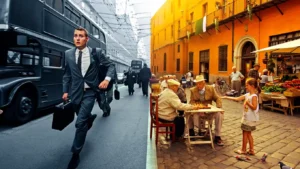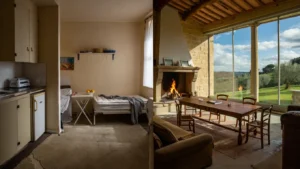In March 2017, I signed the lease for what felt like a little slice of Fulham paradise: a two-bedroom flat on Rackton Road with a terrace big enough for a table, two chairs, and exactly one optimistic barbecue.
It sat in that sweet spot between West Kensington, West Brompton, and Fulham Broadway, close enough to good coffee but far enough from late-night kebab chaos.
At £1,600 a month (before bills), it was not exactly cheap, but this was London, complaining about rent was like complaining about the rain. Add council tax and utilities, and my monthly housing bill came to around £2,100. Still, it was home.
Fast forward to post-COVID London, and that same type of flat now rents for £2,300–£2,600. Apparently, “cost of living crisis” was just another way of saying “your landlord would like to buy another yacht.”
Buying in London: The Math Didn’t Math
Like many renters, I thought about buying. I wanted to stay in the same area, Fulham felt like my London village.
Then reality hit me square in the face. Smaller, less impressive flats started around £600k–£650k. Anything that looked like my place (or better) was closer to £800k–£900k.
Yes, banks were happy to throw a mortgage at me with a 0–5% deposit, but monthly payments would have been £3,000–£3,500. For that money, I’d expect marble floors, a view of the Thames, and maybe a butler named Alfonso. What I’d actually get was… my current flat, but with a bank breathing down my neck for 30 years.
It didn’t seem worth it.
Enter Italy

In August 2023, I married Daniela, who runs her Pilates and osteopathy business online. Two months later, we packed our lives into boxes and headed to Italy, specifically the Piedmont region, near Lake Viverone.
We now rent a four-floor villa. Yes, four floors. Each one could be its own two-bedroom apartment. There are four bathrooms (three actually usable), a massive garden, and a view of the lake that makes you forget about all your old London Tube delays.
Our rent? €1,900 a month, about £1,700. Bills push it up to roughly €2,100 (£1,850). The equivalent space in London? At least three times the cost, and probably without the garden or lake view.
The Daily Cost of Living Shift
The difference is not just in rent.
In Italy, a cappuccino is €1.50. In London, I’ve paid more than that for the oat milk surcharge alone. Weekly groceries cost about what you’d pay in Tesco, but with the quality of Waitrose. And most of it is fresh, local produce, because here, “local” doesn’t mean “shipped from France overnight.” It means someone down the road grew it this morning.
In London, post-COVID price jumps hit everything from bread to broadband. I’d watch my bills creep up every few months. In Italy, things still feel more grounded.
The Bureaucracy Olympics
Before you think I’m painting Italy as an administrative wonderland, let me be clear: it’s not.
Getting residency, even with an Italian wife and income, took over a year. The local government’s system seemed like it was designed by someone who didn’t want anyone to actually use it. You need a paid PEC email just to see appointments. Then the system asks for your email, tells you to call, and then informs you the ticketing system is broken. It’s a bit like trying to buy Glastonbury tickets if Glastonbury also required proof of address and a blood sample.
As for buying property here? I can’t get a mortgage without an Italian financial history, so the only option is buying outright. The kind of villa we’re renting goes for about €500k. Cheaper flats exist (€60–80k), but they’re small and not what we want long-term.
And moving a large sum from the UK to Italy? My accountant basically said: “Sure, you can do that, if you’d like to make an enormous tax donation.”
What I Miss About London
I’d be lying if I said I didn’t miss a few things. London’s convenience culture is hard to beat, Deliveroo, Uber, corner shops open at 2am. In my Italian town, you can forget about those. If you want a takeaway at midnight, you’d better have cooked it yourself six hours earlier.
I also miss the buzz of the city. There’s a certain energy in London, half stress, half caffeine, that keeps you moving. Here, things are slower. That’s great for your blood pressure, but occasionally frustrating when you’re waiting two weeks for a plumber.
Why It Was Still Worth It
Despite all that, I wouldn’t reverse the decision.
The quality of life here is higher. We have more space than we know what to do with. The air is cleaner. The food tastes better. Daniela is close to her family, and I get to work remotely in peace.
In London, I felt like I was running to keep up, paying more and more just to stand still. In Italy, the pace suits us. Even my dog seems happier, now that he has a garden to tear around instead of a communal hallway.
The London Property Problem
One thing that pushed me out the door was seeing who was actually buying in London. Increasingly, it’s not the locals. It’s wealthier international investors parking their money in bricks and mortar. That drives prices up, making it harder for people who live and work in the city to buy.
Post-Brexit and post-COVID, it’s felt even more pronounced. If you don’t have a massive deposit or family help, you’re looking at decades of renting, or committing to a mortgage that eats your income alive.
Advice If You’re Considering the Same Move
Don’t do it on a whim. Moving countries is not like changing postcodes. There’s a ton of admin, tax implications, and cultural adjustments.
But if your work is remote and you’re not tied to a specific city, it’s worth running the numbers. For us, the math was simple: for less than we’d pay for a small London flat, we have a lake-view villa and room for guests.
If you’re someone who loves countryside life, enjoys cooking at home, and doesn’t mind a slower pace, the benefits outweigh the headaches. Just brace yourself for Italian bureaucracy, it’s less “form filling” and more “multi-level puzzle game.”
Leaving London wasn’t about rejecting the city. I’ll always love it, just not at £2,500 a month for the privilege of hearing my upstairs neighbour’s washing machine at midnight.
Italy has its own frustrations, but I wake up every day to a view that still makes me do a double take. And when my cappuccino costs less than £2, I can live with the fact that the nearest Uber is about 80 miles away.



